Raiders Football Team Wins Halloween Game to Advance to the Semifinals
- Details
- Written by: Dave Taber
- Hits: 1362
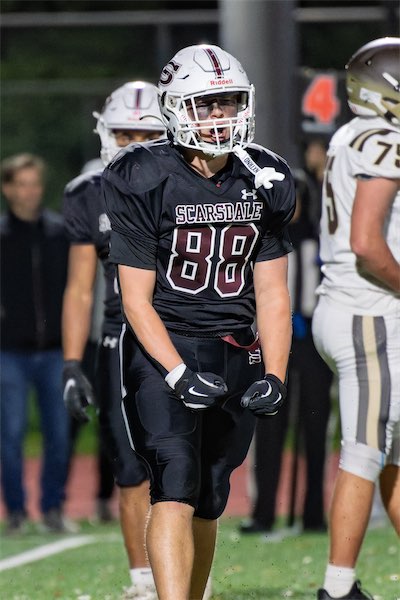 Sam Stahler (#88) celebrates after a key defensive stop.The Scarsdale High School Varsity Football Team hosted Clarkstown South on Halloween night in the opening round of the Section 1 Class AA playoffs. After a slow start, the Raiders found their rhythm on both sides of the ball, wearing down the Vikings with a strong running game and a dominant defensive effort.
Sam Stahler (#88) celebrates after a key defensive stop.The Scarsdale High School Varsity Football Team hosted Clarkstown South on Halloween night in the opening round of the Section 1 Class AA playoffs. After a slow start, the Raiders found their rhythm on both sides of the ball, wearing down the Vikings with a strong running game and a dominant defensive effort.
Quarterback Patrick Simon (#11) led the way, scoring both of Scarsdale’s touchdowns as the Raiders earned a hard-fought 14–3 victory. The defense was outstanding, holding Clarkstown South to a single field goal and delivering key stops throughout the night to seal the win.
With the victory, Scarsdale advances to the semifinal round, where they’ll travel to face the top-seeded John Jay Patriots.
Photos by Dave Taber of Shots of the Game. To see more game photos and/or download photos, please visit https://www.shotsofthegame.com/

Chase Kantor (#1) pitches to Alex Krupkin (#15) on a sweep to the right.
 Andre Duval (#41) powers forward for extra yards.
Andre Duval (#41) powers forward for extra yards.
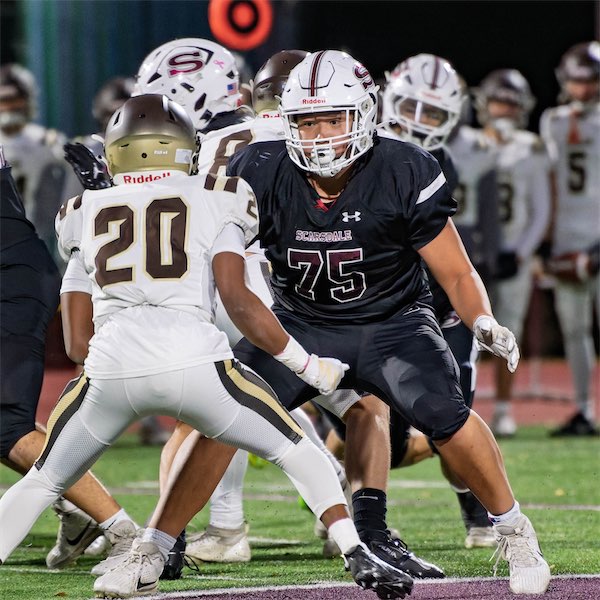
David Zhang (#75) prepares to block on a running play.

Alex Krupkin (#15) breaks free from a would-be tackler. (#69) punts the ball downfield.
(#69) punts the ball downfield.

Lars Burrows (#19) and Colin Brennan (#42) combine to bring down a Clarkstown South runner.
Chase Kantor (#1) keeps the ball and fights for extra yardage.
Patrick Simon (#11) cuts past a defender for a big gain. Joseph Pappalardo (#9) makes a leaping catch near the sideline.
Joseph Pappalardo (#9) makes a leaping catch near the sideline.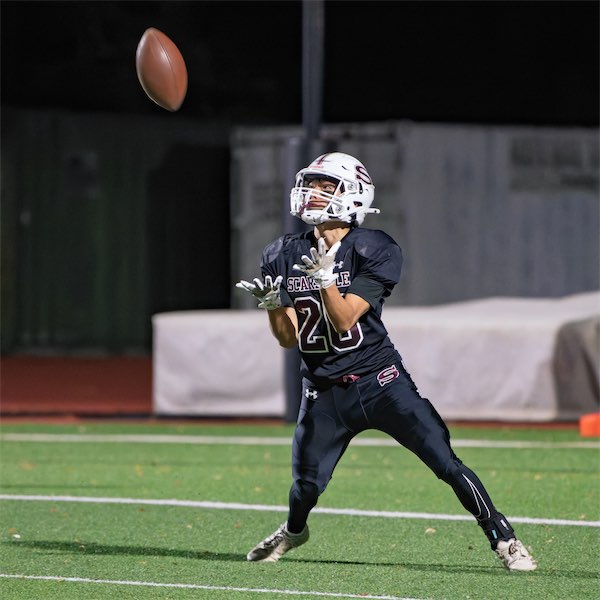 Kojiro Hirata (#20) fields a punt before his long return
Kojiro Hirata (#20) fields a punt before his long return

Nico Brenner (#8) stops a Clarkstown South receiver.
Keep Scarsdale Teens Safe on Halloween Weekend
- Details
- Written by: Joanne Wallenstein
- Hits: 1228
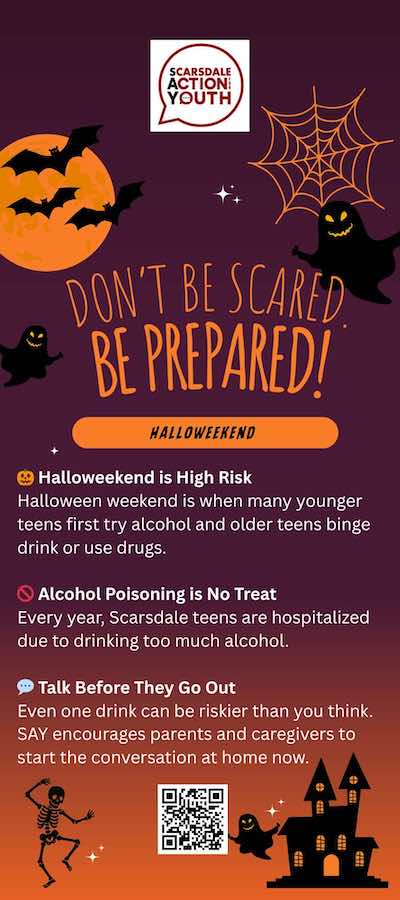 “Halloweekend” or the weekend closest to Halloween (October 31st) has unfortunately become synonymous with alcohol and drug use by many Scarsdale teens. The Scarsdale Action for Youth, in partnership with its community partners, encourages you to help keep our teens and young adults safe this Halloween.
“Halloweekend” or the weekend closest to Halloween (October 31st) has unfortunately become synonymous with alcohol and drug use by many Scarsdale teens. The Scarsdale Action for Youth, in partnership with its community partners, encourages you to help keep our teens and young adults safe this Halloween.
Teens as young as 12 years old use Halloweekend as a reason to experiment with alcohol, while older teens use it as an occasion to binge drink. In fact, according to the Centers for Disease Control, 94% of underage drinking meets the criteria for binge drinking. While younger teens usually obtain alcohol from their homes, older teens often obtain large amounts of alcohol using Fake IDs.
Teens will often “pre-game” in small groups in homes with less supervision or more permissive parental attitudes, before heading to larger gatherings. During Halloweekend, intoxicated teens often roam Scarsdale neighborhood streets in the dark, further impacting their health and safety.
Underage drinking and drug use in any amount is dangerous and is not an expected part of growing up or a “right of passage.” Studies have shown that the early initiation of alcohol use increases a teen’s chances of developing drug and alcohol problem behaviors, including addiction, as they get older. There is no such thing as “responsible teen drinking.
Here's what parents can do:
-Talk to your teens about their Halloween plans and about the dangers of alcohol and drug use.
-Lock up any alcohol and drugs (including prescriptions) in your home.
-If you host a party, please make sure you provide proper ADULT supervision. Under New York’s Social Host Law, homeowners can be held legally responsible for any underage drinking or drug use on their property, and if someone gets injured, they can be held civilly liable.
-Consider hiring off-duty police officers to ensure your party does not grow beyond a size that you can supervise.
-Let your teens know they can contact you at any time, without consequence, if they or friends are using drugs or alcohol and need help.
-Please do not try to sober someone up with food or water. Food and water can cause choking.
MOST IMPORTANTLY: Advise your teens to call 911 IMMEDIATELY if one of their friends is passed out or is unresponsive. Westchester County has a Good Samaritan law that protects teens from legal consequences if they are seeking help.
Apple Picking Fun Near Scarsdale: Farms for Everyone
- Details
- Written by: Sharon Higgins
- Hits: 2796
 Apple season is in full swing, and families in Scarsdale don’t have to travel far to enjoy a classic fall outing. Several nearby farms offer more than just apple picking, with activities ranging from pumpkin patches and hayrides to live music and farm fresh treats.
Apple season is in full swing, and families in Scarsdale don’t have to travel far to enjoy a classic fall outing. Several nearby farms offer more than just apple picking, with activities ranging from pumpkin patches and hayrides to live music and farm fresh treats.
A community favorite is Wilkens Farm in Yorktown Heights, where one local resident shared that she and her family have been visiting for years. Beyond apple picking, Wilkens offers a pumpkin patch, a corn maze, and a country market stocked with fresh-baked donuts, pies, and local produce, making it a full-day experience for kids and adults alike.
Another Scarsdalian recommends nearby Outhouse Orchards in North Salem, which is especially convenient for Scarsdale residents looking for a shorter drive. Known for its wide variety of apples and scenic hillside views, Outhouse also features hayrides, a pumpkin patch, and plenty of seasonal food stands.
For families seeking more than just apple picking, many area farms also host live music on weekends, offer petting zoos, or feature craft vendors, turning a simple outing into a festive fall celebration. Whether you’re looking for a quick trip or an all-day adventure, the farms around Scarsdale provide plenty of ways to savor the season.
Here are several orchards within driving distance of Scarsdale that offer apple picking plus other seasonal attractions. Best to check each farm's website before going, since hours and offerings may change.
🍎 Wilkens Fruit & Fir Farm
📍 1335 White Hill Rd, Yorktown Heights, NY
🚗 ~30 minutes from Scarsdale
🕐 Open Wed–Mon, 10 am–5 pm (closed Tuesdays)
A long-time favorite for many Scarsdale families, Wilkens offers apple and pumpkin picking, a corn maze, and a country market stocked with cider donuts, pies, and seasonal goods. It’s ideal for families with kids of all ages, since there’s plenty of variety from orchards for exploring to treats for winding down.
🍏 Outhouse Orchards
📍 139 Hardscrabble Rd, North Salem, NY
🚗 ~35 minutes from Scarsdale
🕐 Open daily, 9 am–5 pm
Close to home and easy to reach, Outhouse Orchards is popular for its wide variety of apples and hillside views. Families can also enjoy hayrides, a corn maze, and pumpkin picking. Great for families with school age kids, since the maze and hayrides add a bit of adventure.
🎶 Harvest Moon Farm & Orchard
📍 130 Hardscrabble Rd, North Salem, NY
🚗 ~35 minutes from Scarsdale (right next to Outhouse)
🕐 Farm store daily 9 am–6 pm; Fall Festival weekends in Sept & Oct
Known for its lively fall festivals, Harvest Moon pairs apple picking with hayrides, BBQ, live music, and plenty of photo-worthy spots. A perfect pick for families who want more of a festival atmosphere, older kids and teens will especially enjoy the food vendors and entertainment.
🎃 Dr. Davies Farm
📍 306 Route 304, Congers, NY
🚗 ~40 minutes from Scarsdale
🕐 Daily 10 am–5 pm; hayrides & corn maze on weekends/holidays
A family-run farm with a laid-back vibe, Dr. Davies offers apple picking daily and adds hayrides, a pumpkin patch, and a corn maze on weekends. It’s a good choice for young children, thanks to the simple, welcoming setup, while still offering enough variety for a fun family day trip.
Quick Picks:
Closest/easiest trip: Outhouse Orchards
Best for younger kids: Dr. Davies Farm
Best for teens or big family groups: Harvest Moon’s fall festivals
Classic all-around experience: Wilkens Farm
Back to School Programs and Activities for the 2025-26 Year
- Details
- Written by: Joanne Wallenstein
- Hits: 4353
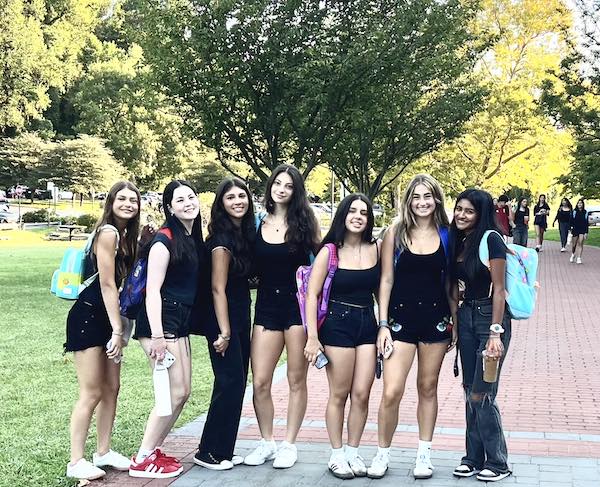 Enjoy the halcyon days of summer while planning for school and activities for the 2025-26 school year. Looking for options for preschool, enrichments, sports or arts programming? You’re in the right place. We reached out to many local schools and programs and here are a host of great offerings for your consideration. Take a look and when you contact those that interest you tell them you noticed them on Scarsdale10583.com.
Enjoy the halcyon days of summer while planning for school and activities for the 2025-26 school year. Looking for options for preschool, enrichments, sports or arts programming? You’re in the right place. We reached out to many local schools and programs and here are a host of great offerings for your consideration. Take a look and when you contact those that interest you tell them you noticed them on Scarsdale10583.com.
GymCats Gymnastics and the NinjaCats Obstacle Course offer co-ed classes for children starting as young as 20 months, with instructional programs progressing through the teen years. From beginner to advanced levels, each class is designed to build strength, coordination, and confidence. When school is out, kids can enjoy action-packed holiday camps. GymCats and NinjaCats promotes athleticism, good health, and a strong foundation for all sports through fun, engaging instruction. We are located at One Odell Plaza, Suite 190, Yonkers NY 10701 (On the Yonkers Hastings town line).
Fall Classes begin September 3rd. Registration is now open! Contact us to learn more or schedule your trial class at 914-965-7676 or at [email protected] or see our website.
The House of Sports is Westchester's premier indoor sports and entertainment destination. Located in Ardsley, the 100,000 sq. Ft. state-of-the-art facility boasts 4 basketball courts, 4 turf fields, 2 batting cages, a full-service cafe, physical therapist and adult fitness programming. The House of Sports offers year-round sports activities including clinics, camps, leagues, tournaments and our very popular sports themed birthday parties. This Fall and Winter the House of Sports offerings include:
This Fall and Winter the House of Sports offerings include:
-Classes and clinics for children of all ages in soccer, basketball, lacrosse, volleyball and multi-sports.
-Holiday Camps on all major holidays when school is out.
-Sports teams and leagues for volleyball, lacrosse and basketball.
-Westchester's best sports themed birthday parties.
Learn more by visiting our website at www.houseofsportsny.com.
Westchester Skating Academy is the premiere ice skating and entertainment center in the tri-state area, located in Elmsford, NY. At WSA, your child can learn to skate, sharpen their hockey skills, throw a themed birthday party, or spin their way to a new figure skating move. 
Our Metro Hockey League is a competitive, fun youth hockey program that includes clinics, games, practices, a team jersey, and more. League divisions include Mites (2017-19), Squirt (2015-16, Peewee (2013-14), and Bantam/JV (2009-12). Evaluations begin September 4th.
WSA’s Learn to Skate and Learn to Play Hockey classes are offered all year long. All levels are welcome, from the first steps on the ice to mastering advanced techniques. The next session of Learn to Skate and Learn to Play Hockey classes begin on September 3rd.
WSA also offers holiday camps throughout the year with the first offerings kicking off September 23rd. Our Camp Chillin, Figure Skating and Hockey Camps are fully supervised and offer both on and off-ice training to develop skaters’ individual skills. Both full day and half day camps are available.
To register or learn more about our fall offerings, please visit skatewsa.com or call 914-347-8232. Westchester Skating Academy is located at 91 Fairview Park Drive, Elmsford, NY. Play tennis and pickleball year-round at SPORTIME Westchester Clubs! Join us at SPORTIME Harbor Island and SPORTIME Lake Isle, where world-class tennis and pickleball meet expert instruction and vibrant player communities! At Harbor Island, enjoy red clay courts and a brand-new Outdoor Pickleball Center, just steps from the water. Over at Lake Isle, play on Har-Tru, soft-surface tennis courts and hybrid pickleball courts, with expanded programs at nearby Leewood Park. Lake Isle also features training at the John McEnroe Tennis Academy, offering high-performance tennis instruction for aspiring competitors. Both clubs are open year-round and offer seasonal camps, group and private lessons, and modern amenities for players of all ages and levels. SPORTIME members have access to our full menu of programs and services, including JMTA training at Lake Isle, reciprocal privileges at other SPORTIME clubs, discounted court-time, and more.
Play tennis and pickleball year-round at SPORTIME Westchester Clubs! Join us at SPORTIME Harbor Island and SPORTIME Lake Isle, where world-class tennis and pickleball meet expert instruction and vibrant player communities! At Harbor Island, enjoy red clay courts and a brand-new Outdoor Pickleball Center, just steps from the water. Over at Lake Isle, play on Har-Tru, soft-surface tennis courts and hybrid pickleball courts, with expanded programs at nearby Leewood Park. Lake Isle also features training at the John McEnroe Tennis Academy, offering high-performance tennis instruction for aspiring competitors. Both clubs are open year-round and offer seasonal camps, group and private lessons, and modern amenities for players of all ages and levels. SPORTIME members have access to our full menu of programs and services, including JMTA training at Lake Isle, reciprocal privileges at other SPORTIME clubs, discounted court-time, and more.
Mamaroneck and Eastchester residents SAVE with special local discounts - ask us how! Coming soon: SPORTIME Pickleball Yorktown offering 12 dedicated pickleball courts and amenities enthusiasts will love.
SPORTIME Harbor Island, https://www.sportimeny.com/hi, or [email protected], (914) 468-4470
SPORTIME Lake Isle, [email protected] | (914) 517-3190
The Arts
For over 80 years, Hoff-Barthelson Music School has set the standard for excellence in music education. Based in Scarsdale and 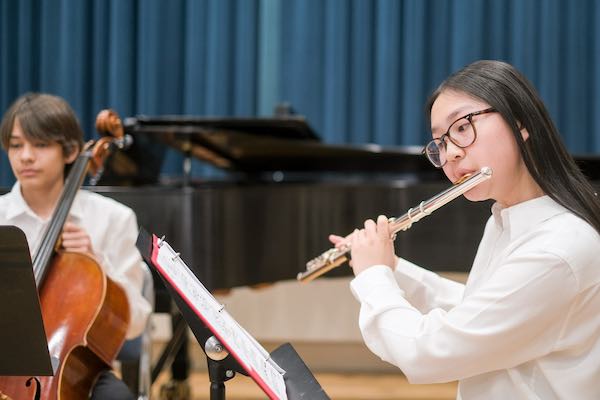 serving students from across Westchester, the School offers a comprehensive curriculum: private lessons, theory and musicianship classes, chamber music, and acclaimed jazz, contemporary, and Youth Orchestra programs. Students flourish under the guidance of world-class faculty—drawn from top conservatories and professional ensembles—who nurture both technical skill and artistic expression. From young beginners to advanced musicians, students are challenged and inspired in an environment that values commitment, creativity, community—and the joy of making music. With flexible tuition and financial aid, Hoff-Barthelson makes outstanding music education accessible to all.
serving students from across Westchester, the School offers a comprehensive curriculum: private lessons, theory and musicianship classes, chamber music, and acclaimed jazz, contemporary, and Youth Orchestra programs. Students flourish under the guidance of world-class faculty—drawn from top conservatories and professional ensembles—who nurture both technical skill and artistic expression. From young beginners to advanced musicians, students are challenged and inspired in an environment that values commitment, creativity, community—and the joy of making music. With flexible tuition and financial aid, Hoff-Barthelson makes outstanding music education accessible to all.
Join us at an Open House on Saturday, September 6, 2025, from 1:00-4:00 pm. Visit www.hbms.org to learn more. Hoff-Barthelson Music School,25 School Lane, Scarsdale,914-723-1169
 The Play Group Theatre offers a fun-filled, non-competitive performing arts program that provides actor training at the highest level while fostering friendships and building skills that last a lifetime. Unique program options for 4-18 year-olds include: full productions in both of PGT’s beautiful state-of-the-art theatres, as well as theatre classes in Acting, Musical Theatre, Improv, Community Cabaret, Sketch Comedy, Design/Tech, and more - only at PGT! Be sure to also check out Camp PGT’s fourteen unique summer program options. To sign up for fall programs and Camp PGT, please visit playgroup.org.
The Play Group Theatre offers a fun-filled, non-competitive performing arts program that provides actor training at the highest level while fostering friendships and building skills that last a lifetime. Unique program options for 4-18 year-olds include: full productions in both of PGT’s beautiful state-of-the-art theatres, as well as theatre classes in Acting, Musical Theatre, Improv, Community Cabaret, Sketch Comedy, Design/Tech, and more - only at PGT! Be sure to also check out Camp PGT’s fourteen unique summer program options. To sign up for fall programs and Camp PGT, please visit playgroup.org.
The Play Group Theatre, One North Broadway, White Plains, 914-946-4433, [email protected].
At the Steffi Nossen School of Dance, dance educators have shared the joy and discipline of dance with generations of Westchester families - whether recreational, preprofessional, or adaptive dancers – since 1937. The school’s caring and supportive dance community reflects Steffi Nossen’s belief that “Anyone can dance and Everyone should.”
of Westchester families - whether recreational, preprofessional, or adaptive dancers – since 1937. The school’s caring and supportive dance community reflects Steffi Nossen’s belief that “Anyone can dance and Everyone should.”
Dance is not only about learning steps; dance enriches the mind, body, and soul. The school’s educationally sound curriculum encourages creativity, technical, and artistic growth. Beginning with Parent and Toddler, graduating to Young Movers Creative Movement or Ballet/Tap, and then to core and pre-professional opportunities in Modern Dance, Ballet, Tap, Jazz, Afrobeats, and Adaptive Dance. Check out Adult Dance and Parkinson’s Dance; you are sure to find something for the dancer in you and your child! Find your favorite at Free Week of Dance October 4-10. Come for the Learning, Stay for the Joy!
Steffi Nossen School of Dance, 216 Central Avenue, White Plains, NY, 914-328-1900, [email protected].
Schools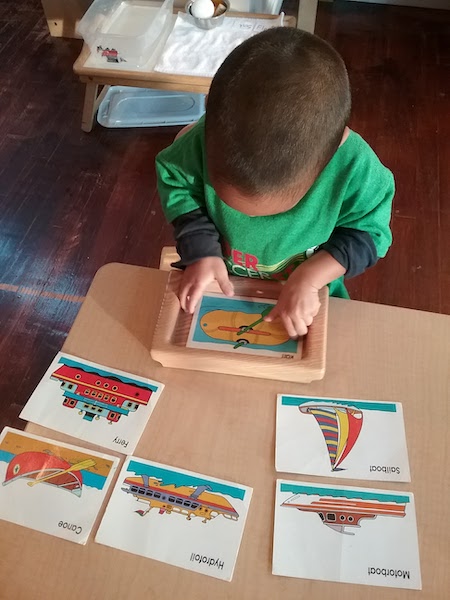
At The Nurtury Montessori, early childhood education is not just a service—it’s a commitment to nurturing young minds during their most formative years. Specifically designed for children from 0 to 6 years old, our Montessori school offers a holistic approach that fosters independence, sensory exploration, and critical thinking.
The Nurtury provides specialized programs tailored to different stages of development. Infants, from six weeks to eighteen months, are cared for in an environment that nurtures sensory exploration and emotional security. Toddlers, aged eighteen months to three years, engage in activities that spark curiosity and build motor skills. Children in the primary program, ranging from three to six years old, benefit from mixed-age classrooms that enhance social skills, empathy, and leadership. Each program supports the unique needs of the child while fostering a lifelong love of learning.
What sets The Nurtury apart is its dedication to creating a sanctuary of peace and support. Children experience meaningful interactions with peers of varying ages, developing confidence and independence through hands-on learning and freedom of choice in a nurturing environment.
We invite you to discover how The Nurtury Montessori can support your child’s growth and development. Schedule a tour today to experience our unique approach to early childhood education and take the first step toward giving your child the foundation they need to succeed. For more information call 914.632.6300 or check our website: www.thenurtury-montessori.com
For further information regarding school registration, please contact ECC Director [email protected] or call us at 914 723-5493. Click here to visit our website.
Mazel Tots® at Scarsdale Synagogue provides a warm and stimulating environment, which encourages children's curiosity and helps 
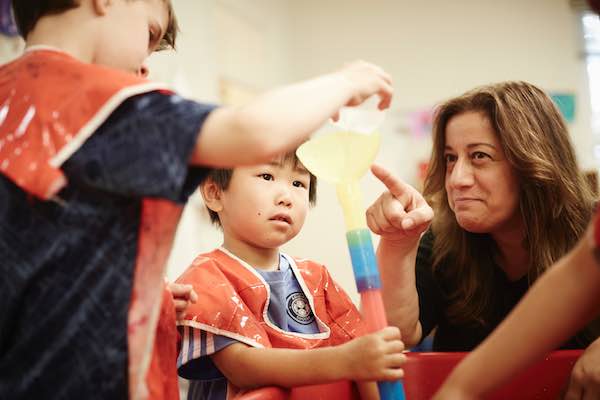 Elmwood Day School provides a warm, child‑centered environment where every child feels safe, known, and respected. Our integrated, play‑based curriculum—rooted in the most current learning standards—blends teacher‑guided instruction with child‑initiated exploration to spark curiosity, creativity, and critical thinking. Light‑filled classrooms are thoughtfully designed to balance purposeful learning and joyful play, both of which are valued throughout a child’s Elmwood experience. Led by experienced, caring educators, our programs nurture each child’s growth and love of learning. Nestled on a summer‑camp property, Elmwood offers extraordinary outdoor opportunities, from an aerial playground and pretend village to a garden, mud kitchen, riding area, climbing structures, and areas for sports. Enrichments and after‑school clubs—such as Science, Drama, and Young Detectives—invite children to go deeper in an area of interest.
Elmwood Day School provides a warm, child‑centered environment where every child feels safe, known, and respected. Our integrated, play‑based curriculum—rooted in the most current learning standards—blends teacher‑guided instruction with child‑initiated exploration to spark curiosity, creativity, and critical thinking. Light‑filled classrooms are thoughtfully designed to balance purposeful learning and joyful play, both of which are valued throughout a child’s Elmwood experience. Led by experienced, caring educators, our programs nurture each child’s growth and love of learning. Nestled on a summer‑camp property, Elmwood offers extraordinary outdoor opportunities, from an aerial playground and pretend village to a garden, mud kitchen, riding area, climbing structures, and areas for sports. Enrichments and after‑school clubs—such as Science, Drama, and Young Detectives—invite children to go deeper in an area of interest.
Reach out to us at: Elmwood Day School, 900 Dobbs Ferry Road, White Plains, 914-592-8577, [email protected], www.elmwooddayschool.com
Kids’ B.A.S.E. and The Little School and the Scarsdale Public Schools are excited to announce the expansion of the  Kids’ B.A.S.E. After-School program. Kids’ B.A.S.E. offers grades K-5 after school care for Scarsdale elementary school students. The nurturing staff and stimulating environment offer an exciting alternative to in-home child care while providing opportunities for socialization, relaxation, and enrichment.
Kids’ B.A.S.E. After-School program. Kids’ B.A.S.E. offers grades K-5 after school care for Scarsdale elementary school students. The nurturing staff and stimulating environment offer an exciting alternative to in-home child care while providing opportunities for socialization, relaxation, and enrichment.
For the 2025-2026 school year, KBLS with the Scarsdale Public Schools will pilot an expansion of the current Kids’ B.A.S.E. program to offer after school care at Edgewood elementary school, Greenacres elementary school, as well as our location at 307 Mamaroneck Road. Registration information can be found on the KBLS website.
We will also be registering for our Little School program for the 2026-2027 school year starting in October of 2025. The Little School was founded in 1991 as a pre-school program for 2-, 3-, 4- and 5-year-olds. Our curriculum fosters early childhood social, emotional and cognitive growth through developmentally appropriate practice. The Little School is accredited by the National Association for the Education of Young Children and licensed by the NYS Office of Children and Family Services. Contact us at 914-472-5409, www.kbls.org 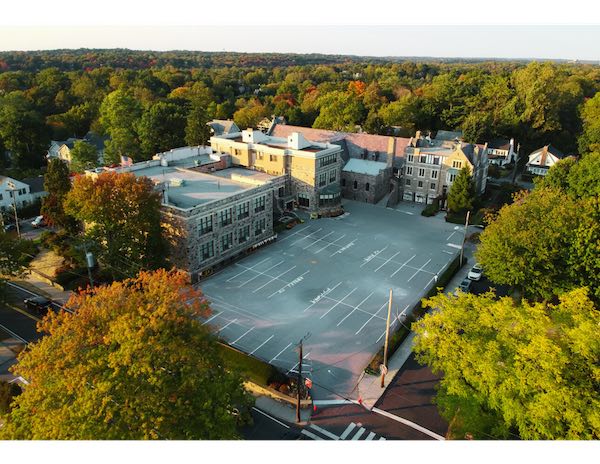 Immaculate Heart of Mary (IHM) is a parish-based Catholic school committed to academic excellence, character formation, and spiritual growth. In today’s ever-evolving world, IHM empowers students to thrive—academically, creatively, and socially from preschool to eighth grade.
Immaculate Heart of Mary (IHM) is a parish-based Catholic school committed to academic excellence, character formation, and spiritual growth. In today’s ever-evolving world, IHM empowers students to thrive—academically, creatively, and socially from preschool to eighth grade.
Through a rich curriculum that integrates core academics with physical education and the arts, students are encouraged to explore their passions and develop their God-given talents. Cutting-edge technology and innovative software tools prepare them for success in the digital age.
Outside the classroom, students grow through meaningful extracurricular activities in a safe, nurturing, and faith-filled environment. Community service is at the heart of the IHM experience—instilling Catholic values, compassion, and a deep sense of responsibility to lead and serve.
Discover a place where students don’t just learn-they flourish." Contact info: Main Office-(914)723-5608, www.ihmscarsdale.org.
Local Organizations
 Enriching The Lives of Children and Adolescents: At Kidz Therapy Services, we provide comprehensive evaluations and personalized therapy programs to help infants and preschoolers achieve their maximum potential. Our services include speech therapy, occupational therapy, physical therapy, autism and behavioral support, and special education. We offer early intervention and preschool-based services to promote the developmental and educational success of every child at our locations, or within the community. For more information go to: https://www.familyofkidz.com/ or 914-686-3316 x1, [email protected]
Enriching The Lives of Children and Adolescents: At Kidz Therapy Services, we provide comprehensive evaluations and personalized therapy programs to help infants and preschoolers achieve their maximum potential. Our services include speech therapy, occupational therapy, physical therapy, autism and behavioral support, and special education. We offer early intervention and preschool-based services to promote the developmental and educational success of every child at our locations, or within the community. For more information go to: https://www.familyofkidz.com/ or 914-686-3316 x1, [email protected]
Maroon and White is the parent volunteer booster association that supports athletics, physical education, student  health and promotes school spirit. Raider Pride Weeks, Raider of the Week, end-of-season team dinners, Media Days, and an end-of-year awards ceremony are just some of the ways we celebrate our student-athletes. Our fundraising helps purchase necessary equipment for the high school athletic teams and physical education programs not covered by the current year school budget. Most recently, we donated a video scoreboard for the gym, a scorers box, wind screens, lamp post flags and a commemorative plaque celebrating our State Championship teams, weights for the Fitness Center, and new team banners for the gym. In the past we led the fundraising efforts for permanent lights at Butler Track and Field and aided in the construction of the SHS Fitness Center plus lots more!
health and promotes school spirit. Raider Pride Weeks, Raider of the Week, end-of-season team dinners, Media Days, and an end-of-year awards ceremony are just some of the ways we celebrate our student-athletes. Our fundraising helps purchase necessary equipment for the high school athletic teams and physical education programs not covered by the current year school budget. Most recently, we donated a video scoreboard for the gym, a scorers box, wind screens, lamp post flags and a commemorative plaque celebrating our State Championship teams, weights for the Fitness Center, and new team banners for the gym. In the past we led the fundraising efforts for permanent lights at Butler Track and Field and aided in the construction of the SHS Fitness Center plus lots more!
Maroon and White membership dues help make all this happen. We hope you will become a member and support Scarsdale athletics. Go Raiders! maroonandwhite.org.
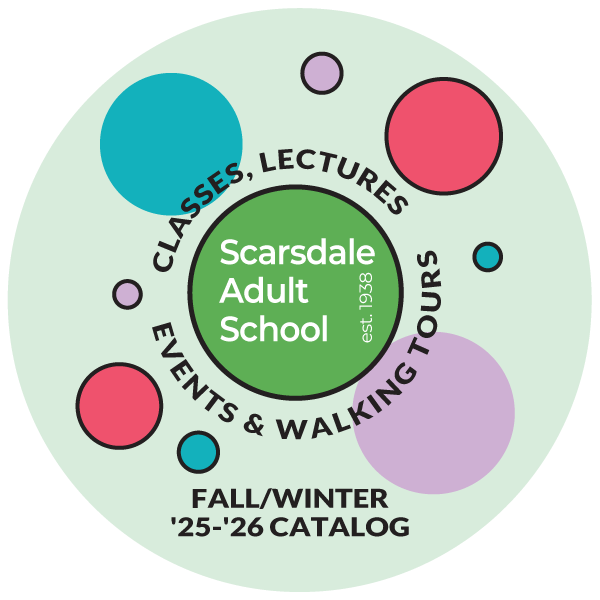 Scarsdale Adult School (SAS), an award-winning source of affordable quality adult education, has a fabulous fall semester starting after Labor Day. Learn the best uses for Artificial Intelligence and ChatGPT, explore world-class art, architecture, and gastronomy on SAS's one-of-a-kind walking tours in NYC, and delve into hot topics in the news such as why school boards matter and bioethics in the pharmaceutical industry. Discuss top-notch literature and films, indulge your creativity in one of the dozens of arts & crafts classes, and stay in shape all year round through in-person or Zoom-based fitness sessions. Visit ScarsdaleAdultSchool.org to register, to subscribe to the weekly newsletter, or to search the catalog. Call (914) 723-2325 with questions.
Scarsdale Adult School (SAS), an award-winning source of affordable quality adult education, has a fabulous fall semester starting after Labor Day. Learn the best uses for Artificial Intelligence and ChatGPT, explore world-class art, architecture, and gastronomy on SAS's one-of-a-kind walking tours in NYC, and delve into hot topics in the news such as why school boards matter and bioethics in the pharmaceutical industry. Discuss top-notch literature and films, indulge your creativity in one of the dozens of arts & crafts classes, and stay in shape all year round through in-person or Zoom-based fitness sessions. Visit ScarsdaleAdultSchool.org to register, to subscribe to the weekly newsletter, or to search the catalog. Call (914) 723-2325 with questions.
Parents Hold the Key at SAY Scarsdale: Scarsdale teens are smart, but they are not always “resist temptation smart.” When alcohol is easy to access, it increases a teen’s chances of making a risky choice. But Scarsdale parents “Hold the Key” and by locking up their liquor, and securing the alcohol they keep in their homes, they can keep their teens and often, their teen’s friends safe.  Data from the 2024 PRIDE Survey revealed that 20% of Scarsdale Middle School 8th graders reported alcohol use, compared to 12% nationally; and 67% of SHS 12th graders reported alcohol use, compared to 41% nationally. The survey further revealed that 40% of middle school students reported that parents either never or seldom discussed problems with drug and alcohol use with them while another 37% reported that parents discussed the repercussions of alcohol use “only sometimes.”
Data from the 2024 PRIDE Survey revealed that 20% of Scarsdale Middle School 8th graders reported alcohol use, compared to 12% nationally; and 67% of SHS 12th graders reported alcohol use, compared to 41% nationally. The survey further revealed that 40% of middle school students reported that parents either never or seldom discussed problems with drug and alcohol use with them while another 37% reported that parents discussed the repercussions of alcohol use “only sometimes.”
Through the “KEY” campaign, the Scarsdale Action for Youth (SAY) outlines the pitfalls of early alcohol use and reminds parents that teens face pressure, curiosity, and opportunity, often right at home. SAY encourages parents to talk with their teens about alcohol and how it hurts their wellbeing. Locking up alcohol isn’t just a physical action. It’s a powerful way to protect your teen from serious harm.”
S.A.Y. is a community coalition dedicated to building resilience among our youth, including reducing underage use of alcohol, marijuana and other drugs that negatively impact the health of our youth. Since its founding in 1984, the DATF has worked to convene all sectors of our community to create positive change for our young people. In July 2015, Scarsdale Edgemont Family Counseling Service (SFCS), an accredited family service agency, assumed the role of Lead Agency and Fiscal Agent for S.A.Y. Please check our website for more info: www.sayscarsdale.org/ or call 914.723.3281.
Looking for a church to call home? At St. James the Less, Episcopal Church, we're liturgically traditional, socially progressive, multigenerational and diverse with members from all over Westchester. Hear thoughtful sermons & beautiful music in a welcoming community with programs for all ages. Our Sunday services are 9am and 10:30am with coffee hour following for fellowship. We have been at 10 Church Lane for 175 years. Come visit and see what’s planned for another great year! All are welcome! (For more information: stjamesscarsdale.org)
It’s time for the annual Blessing of the Backpacks! Bring your backpacks, briefcases, and gym bags to have them blessed for a new fall season. Services on Sunday August 31 at 9am and 10:30am are followed by a welcoming coffee hour at 10 Church Lane, Scarsdale. Come join us. All are welcome! (For more information: stjamesscarsdale.org)
This back to school season all Scarsdale residents are encouraged to sign up for a library card at the Scarsdale Public Library. There are no fines, no late fees, and digital materials are available 24/7. Library cards provide access, connection, independence, and responsibility, and parents can sign up their children (of all ages) either in-person or online through the library website. Study rooms are available and students can reserve them ahead of time using their Scarsdale library card through the library’s website or app. On Tuesday, September 2 at 4pm students in grades 3 - 6 are welcome to stop in to make a Backpack Charm. For those who are not yet in school, the Scarsdale Public Library offers a 1000 Books Before Kindergarten program to encourage literacy from birth and up.
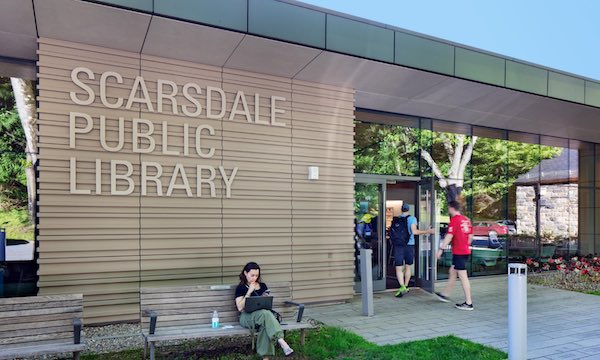 The Teen Services Department has many programs supporting students' academic, leisure, and civic interests. On August 25 and 27 at 7pm, students new to Scarsdale Middle School will benefit from older students' advice at SMS 101. On August 30 at 11am, participate in summer's last hurrah with ZTag (laser tag with watches) on the Olmsted Lawn. In September, students are invited to play bingo (the 6th at 3pm), join the Teen Advisory Board (the 9th at 7pm), learn to crochet (the 14th and 28th at 3pm for grades 5-8), hear pro-tips from current SHS upper-level students at SHS 101 (the 16th at 7pm), learn SAT strategy with The Princeton Review (the 17th at 7pm), make jewelry for a good cause with Bling's The Thing (the 20th at 1pm), and hear from SHS alum and retired U.S. district attorney Robert Groban at The Immigration Debate (the 30th at 7pm).
The Teen Services Department has many programs supporting students' academic, leisure, and civic interests. On August 25 and 27 at 7pm, students new to Scarsdale Middle School will benefit from older students' advice at SMS 101. On August 30 at 11am, participate in summer's last hurrah with ZTag (laser tag with watches) on the Olmsted Lawn. In September, students are invited to play bingo (the 6th at 3pm), join the Teen Advisory Board (the 9th at 7pm), learn to crochet (the 14th and 28th at 3pm for grades 5-8), hear pro-tips from current SHS upper-level students at SHS 101 (the 16th at 7pm), learn SAT strategy with The Princeton Review (the 17th at 7pm), make jewelry for a good cause with Bling's The Thing (the 20th at 1pm), and hear from SHS alum and retired U.S. district attorney Robert Groban at The Immigration Debate (the 30th at 7pm).
Join the Movement: Help Build a Safer, Stronger Scarsdale
- Details
- Written by: Joanne Wallenstein
- Hits: 1389
 (Submitted by the Scarsdale SAFE Coalition)
(Submitted by the Scarsdale SAFE Coalition)
Violence—whether in schools, families, or our broader community—affects us all. It’s time to come together, raise our voices, and take action.
The Scarsdale SAFE Coalition, brought to you by Scarsdale Edgemont Family Counseling Service (SFCS), is proud to serve as a leading voice in the community’s ongoing efforts to prevent and reduce violence in all its forms. With a strong commitment to prevention, education, and empowerment, this initiative aims to foster a safer, healthier environment for all residents of Scarsdale.
The SAFE Coalition brings together community members, service providers, educators, and local leaders to address the root causes of violence—whether in homes, schools, or public spaces—and to promote non-violent problem solving and access to critical support resources.
. The SAFE Coalition is dedicated to:
• Raising awareness about the impact and signs of school, family, and community-based violence
• Connecting residents with the resources and support systems available to them
• Teaching non-violent communication and conflict resolution skills that help build healthier relationships
We’re calling on members from all sectors of the community to be part of the solution. Whether you're a parent, educator, student, business owner, or concerned resident—your voice and participation matter.
Ready to make a difference?
Join the SAFE Coalition today and help us create a more peaceful and connected Scarsdale. For more information or to join the initiative, please contact the SAFE Coalition Coordinator Millie Chatelain, LMHC at [email protected].
Together, we can make Scarsdale a SAFE community for everyone.







